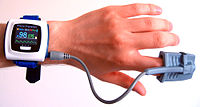
Photo from wikipedia
Being a parent of a baby admitted to a neonatal unit (NNU) can be a frightening and distressing experience. The NNU is usually an unfamiliar and often intimidating environment for… Click to show full abstract
Being a parent of a baby admitted to a neonatal unit (NNU) can be a frightening and distressing experience. The NNU is usually an unfamiliar and often intimidating environment for parents who easily feel overwhelmed and anxious. Any perceptions of lack of information and personal understanding may lead to feelings of powerlessness and stress. All these factors lead to early challenges for developing a strong parent–infant bond. Parental interaction with their newborn can also be limited due to fear, personal reluctance, medical acuity and separation, leading to long-term negative implications for family behaviour and, ultimately, the infant’s future. Building resilience to mitigate these negative factors includes communication and teaching from neonatal staff to empower parents with the greatest opportunity to form a healthy relationship with their infant. Growing evidence demonstrates benefits to the parent and child when parents actively engage in their baby’s care. Active care participants need to have a solid grasp of their baby’s health-care status and needs. Alternative education methods are needed for fathers, who are often overlooked by maternal and child health education services more tailored to the woman’s needs. Despite nursing and medical staff’s best efforts, parents continue to crave accurate information that is more easily understood. They are progressively turning to the internet for advice, with studies showing that the internet is the most preferred source of health-care information besides health-care professionals. On average, new parents with an infant as a NICU patient will invest 20 h/week seeking health information from various sources, including the internet. The challenge locating reliable, up-to-date information from trustworthy sources on the internet has led to suggestions that health professionals guide parents to find the most accurate and up-to-date electronic resources and even consider developing their own resources specific to their area of practice. Health literacy can be a challenge, particularly among young or disadvantaged parents, which requires written information to be aimed at lower reading ages, to avoid medical jargon, to use a simple layout and photos and to ensure any resource is most effective. Parent education materials benefit from being visually attractive and meeting the varying learner styles of all parental demographics. Evidence shows that videos, social media and other technology-based formats appeal to younger age groups and should enhance educational compliance, even potentially resulting in a reduced length of stay. Most parents have smartphones, and up to 83% report using these devices for internet access. Available apps for parents of an NNU baby are predominantly American and are targeted to parents of preterm babies. Recent research highlights a need for unique applications to address specific concerns of particular patient/family groups, which can be achieved by designing a tool specifically for the needs of a target audience. For this reason, we developed a smartphone app ‘Babble’, with the needs of neonatal parents in our NNU in New Zealand in mind.
Journal Title: Journal of Paediatrics and Child Health
Year Published: 2018
Link to full text (if available)
Share on Social Media: Sign Up to like & get
recommendations!